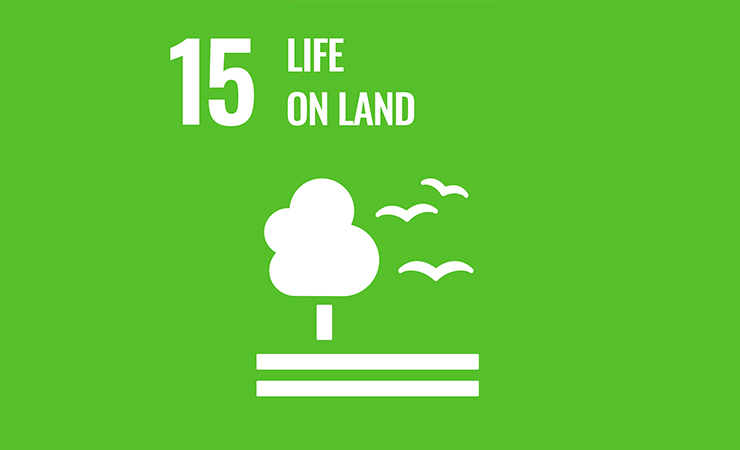- Beranda
- Profil
- Pendidikan
- Riset & Pengmas
- Unit Kerjasama
- Fasilitas & Umum
- Akses Cepat
15.2.1 Events about sustainable use of land
Support or organise events aimed to promote conservation and sustainable utilisation of the land, including forests and wild land
–
15.2.2 Sustainably farmed food on campus
Have policies to ensure that food on campus is sustainably farmed
–
15.2.3 Maintain and extend current ecosystems’ biodiversity
Work directly to maintain and extend existing ecosystems and their biodiversity, of both plants and animals, especially ecosystems under threat
–
15.2.4 Educational programmes on ecosystems
Offer educational programmes on ecosystems (looking at wild flora and fauna) for local or national communities?
–
15.2.5 Sustainable management of land for agriculture and tourism (educational outreach)
Offer educational programme/outreach for local or national communities on sustainable management of land for agriculture and tourism
–
15.3.1 Sustainable use, conservation and restoration of land (policy)
Have a policy to ensure the conservation, restoration and sustainable use of terrestrial ecosystems associated with the university, in particular forests, mountains and drylands
–
15.3.2 Monitoring IUCN and other conservation species (policies)
Have a policy to identify, monitor and protect any IUCN Red Listed species and national conservation list species with habits in areas affected by the operation of your university
–
15.3.3 Local biodiversity included in planning and development
Include local biodiversity into any planning and development process (e.g. construction of new buildings)
–
15.3.4 Alien species impact reduction (policies)
Have a policy to reduce the impact of alien species on Campus
–
15.3.5 Collaboration for shared land ecosystems
Collaborate with the local community to maintain shared land ecosystems
–
15.4.1 Water discharge guidelines and standards
Have water quality standards and guidelines for water discharges (to uphold water quality in order to protect ecosystems, wildlife, and human health and welfare)
FTUI has water quality standards and water disposal guidelines listed in the I-Cell Book (page 46-50). The I-Cell Book is a guide that contains information about the I-Cell building and still applies today. The I-Cell Building is an Integrated Creative Engineering Learning Laboratory that provides smart building technology that strives for efficiency and environmental preservation. This book explains various types of standardization, measurements and programs related to environmental preservation.
Evidence Link :
15.4.2 Policy on plastic waste reduction
Have a policy on reducing plastic waste on campus
FTUI has an action plan to reduce plastic waste on campus by bringing Tumblr and providing a drinking water fountain. The program can be seen in sustainability report 2022 FTUI (page 46-49)
Evidence Link :
FTUI Sustainability Report 2022
15.4.3 Policy on hazardous waste disposal
Have a policy, process or practice on waste disposal covering hazardous materials
FTUI has a hazardous waste disposal policy. All hazardous and toxic waste (LB3) is collected at the LB3 FTUI Temporary Storage Place (TPS) and then transported by the Transporter to be processed by a licensed Processor. The hazardous waste disposal process is contained in the FTUI 2022 sustainability report (pages 58-60).
Evidence Link :

